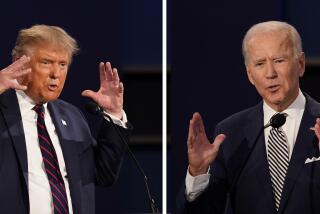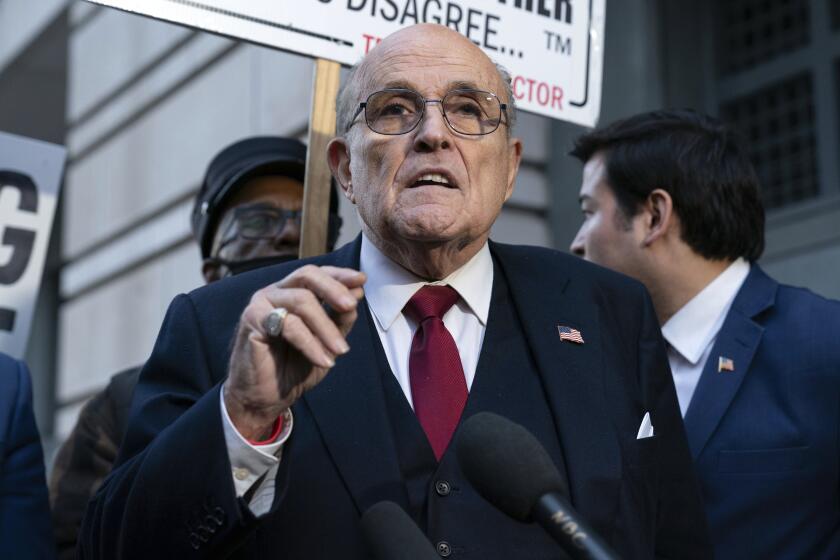House Rejects Road Bill Veto in 350-73 Vote
The House, beginning a crucial test of President Reagan’s ability to reassert his command of the national agenda, voted overwhelmingly Tuesday to override his veto of highway legislation--a vote that had more than half of all House Republicans siding with their local interests rather than the President.
As expected, the House tally Tuesday was lopsided: 350 to 73, well beyond the 290-vote majority required to override. Despite a personal appeal by Reagan in a rare trip to Capitol Hill last week, 102 of the 177 House GOP members voted against him.
The more significant battle over the veto is scheduled for today in the Senate, where the vote is considered too close to call. Minority Leader Bob Dole (R-Kan.) has described the outcome as “important to (Reagan’s) leadership.” A presidential veto can be overturned only by a two-thirds vote of both houses of Congress.
Over the next five years, the $88-billion highway measure would finance more than 120 local projects. It also includes funds for mass-transit projects, the largest portion of which is the $870 million to be spent for the Los Angeles Metro Rail subway.
Also part of the legislation is a provision, favored primarily by lawmakers from the sprawling West, that would allow states to raise the speed limit to 65 m.p.h. on rural interstate highways. The California Legislature, Gov. George Deukmejian and the California Highway Patrol are on record favoring the speed limit increase, which would affect 1,205 miles of highway in the state.
Although Reagan supports the speed limit provision, he vetoed the bill Friday, contending that it was larded with special-interest projects. The President singled out Metro Rail as one of the projects that should not be undertaken at a time of ballooning federal budget deficits.
Unfair Share Seen
In arguing to sustain the veto, Rep. Robert S. Walker (R-Pa.) suggested that an unfair share--”14% of the money that we all contribute” to the federal trust fund that finances mass transit--would go to Los Angeles under the legislation.
The five-member, all-Republican Orange County delegation, usually staunch supporters of the President, split on the override vote.
Reps. Robert E. Badham of Newport Beach, Robert K. Dornan of Garden Grove and Daniel E. Lungren of Long Beach voted against the override. But Rep. William E. Dannemeyer of Fullerton did not vote, and Rep. Ron Packard of Carlsbad voted to override the veto.
Packard, a member of the House Public Works and Transportation Commission and its surface transportation subcommittee, spoke twice from the floor in favor of the highway bill, praising it as good legislation reached after long, delicate negotiation.
Chided by other members as he entered a Capitol elevator, Packard shot back: “You guys want the money for your projects, but you don’t want to vote for them.”
The bill contains an $18.8-million demonstration project for California 78 from Oceanside to Escondido, which lies within Packard’s district. By contrast, the only demonstration project in the bill to affect Orange County is a $900,000 allocation to build a “computerized transportation management system” in Anaheim.
A spokesman for Dannemeyer said the congressman did not vote because he was in Arizona on Monday speaking “on health matters” before the American Bakers Assn. Dannemeyer is a member of the House Energy and Commerce Committee’s subcommittee on health and environment.
The President has offered a less expensive alternative to the legislation, but House Public Works and Transportation Committee Chairman James J. Howard (D-N.J.) noted that the White House bill also includes more than 30 major policy changes. By the time such legislation worked its way through various committees, he said, this year’s highway construction season will have passed.
The significance of the bill has grown far beyond the debate over whether to finance bridges, roads and subways. It is seen as a crucial test of whether the Administration can work its will over Congress after the Iran- contra affair and the loss in November’s elections of Republican control of the Senate.
Veto Overridden
Earlier this year, Reagan’s veto of clean-water legislation was overridden. However, that veto was considered a less direct affront to Congress than this effort, which would eliminate more wide-ranging and politically sensitive transportation projects.
“Everyone knows the issue today is not highways--it’s the President’s political recuperation,” said Rep. Douglas H. Bosco (D-Occidental).
A White House official, speaking on condition of anonymity, said the struggle over the highway bill could indicate how much authority the President can wield in the remaining 22 months of his term. At the center of the dispute, he said, is “how he stands--his ability to have Congress deal with him, rather than Congress setting all the marks.”
Plea by Baker
Former Senate Majority Leader Howard H. Baker Jr., who became White House chief of staff as part of an effort to reinvigorate the Administration, met with Senate Republicans Tuesday and pleaded with his former colleagues to sustain the veto.
“I told them in there it’s not just the President’s hide they are trying to nail, it’s mine,” the Tennessee Republican said after the closed meeting. Baker added that he was “guardedly optimistic” that the President would prevail, even though he did not yet have sufficient votes.
Senate Majority Leader Robert C. Byrd (D-W.Va.) pressed for Senate action on the veto Tuesday, but Dole stalled, in part to allow Reagan time to sway the few votes that could give him a victory.
Home-State Pressure
While House Republicans expressed anguish over abandoning their President at a time when he badly needs a victory, most were under even greater pressure from home-state contractors, motorists and local officials not to sacrifice the projects included in the legislation.
Labor unions were also lobbying vigorously for the legislation, which supporters said would create 800,000 jobs--a figure that opponents disputed as grossly exaggerated.
“President Reagan, he ain’t going to be running in 1988, but I am,” said Rep. Arthur Ravenel Jr., a freshman Republican from South Carolina whose district would receive a $19-million bridge.
‘Agonizing Decision’
House Minority Leader Robert H. Michel (R-Ill.) said that it was a “very difficult, agonizing decision” to cast his first vote ever against one of Reagan’s recommendations but that his constituents badly need a project that would widen a congested road that had become “a pain in the you-know-what to drive.”
“Frankly,” he added, “this veto should have been avoided.”
Democrats, meanwhile, accused Reagan of putting his own political fortunes ahead of important highway improvements.
“I understand our President’s desire to demonstrate he is still tall in the saddle,” said Rep. Norman Y. Mineta (D-San Jose). “But our highways should not be allowed to deteriorate to the point where we all have to ride horses.”
Lone Democrat
Just one Democrat, Rep. Norman Sisisky of Virginia, voted to sustain the veto. He complained that other states had profited in the legislation at Virginia’s expense.
In addition to the Metro Rail funds, the bill provides funds for 15 so-called “demonstration projects” in California--projects that have special political appeal because money spent on them does not count against the amount the state would receive under regular federal highway funding formulas. However, the state is required to come up with 20% of the total spent.
Although opponents described the bill as a “budget buster,” most of the funds--$76.4 billion--come from gasoline taxes and other money already set aside in the federal Highway Trust Fund.
Times staff writers James Gerstenzang, Sara Fritz and Steve Emmons in Orange County contributed to this story.
More to Read
Get the L.A. Times Politics newsletter
Deeply reported insights into legislation, politics and policy from Sacramento, Washington and beyond. In your inbox three times per week.
You may occasionally receive promotional content from the Los Angeles Times.






